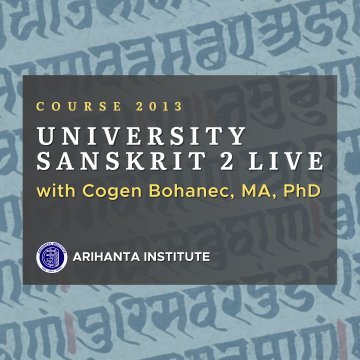University Sanskrit 2 Live


University Sanskrit 2 Live
 16-week Live Course: January 27 - May 16, 2025
16-week Live Course: January 27 - May 16, 2025Course 2013
**This synchronous, "live" online course is a university length (16-week) seminar for those wishing to study Sanskrit in a scheduled, live setting with a university professor (class meets twice a week, Mondays and Fridays at 9:30 a.m. - 10:55 a.m. Pacific). For those looking to study in a self-paced, asynchronous course, please enroll in 2011 | Research Sanskrit: Level 2**
In this course, which is Part 2 of 2 (see Course 2012 for first part), students will complete the equivalent of their second semester of graduate level Sanskrit. Students will gain necessary competency for Sanskrit 2 as well as the important research skills necessary to translate Sanskrit texts by translating modified excerpts from Sanskrit literature. These research skills include basic philology such as etymology, the ability to identify inflexions and grammatical forms, and syntactical analyses.
Upon completion of this course (and its prerequisite Course 2012), we will have completed the Devavāṇīpraveśikā Sanskrit primer (Goldman and Goldman, 1980). In the process, students will learn to memorize, recognize, and recall all major paradigms of inflection (conjugations, declensions, indeclinable suffixes, prefixes, etc.) and use these skills when translating, reading, memorizing, or liturgically reciting Sanskrit texts.
Competency with Sanskrit translation is a key skill for academics in the field of South Asian Studies. It is one of the most important research skills that gives scholars access to resources that are the object of their research, and it is also a skill that, when demonstrated with translations in one’s publications, gives a great deal of much needed credibility to the academic work of scholars.
Sanskrit can also be very helpful to strengthen and deepen one’s connection to one’s own spiritual tradition. For most Dharma traditions (Jainism, Hinduism, and Buddhism), Sanskrit is often the medium of liturgical practices, and Sanskrit texts also tend to form the doctrinal, philosophical, and practical foundation for individual and collective spiritual practices in those traditions. Dharma traditions are deep reservoirs of spiritual wisdom that have the power to transform us personally and collectively in profound ways, and Sanskrit is on one of the most important keys to unlocking that great reservoir of ancient spiritual wisdom that is much needed in our own personal lives, and in our collective society at large.
Learning Objectives:
1. Learn to read Sanskrit in Devanagari font.
2. Acquire basic Sanskrit vocabulary.
3. Learn to identify and understand the basic grammatical forms covered in class.
4. Learn to understand key differences between Sanskrit and English syntaxes and to be able to convert Sanskrit syntax into English syntax.
5. Learn basic skills for translation of Sanskrit primary sources for research.
6. Become familiarized with other cultural and intellectual elements of the broader Sanskrit tradition.
Course Details
• Live online, synchronous course runs January 27, 2025 to May 16, 2025• Class meets twice a week, Monday and Friday at 9:30 a.m. -10:55 a.m. Pacific
Learning Area
 Jain Philosophy, History & Anthropology
Jain Philosophy, History & Anthropology Instructor
 Cogen Bohanec, MA, PhD
Cogen Bohanec, MA, PhD Enrollment Options
14-DAY FREE TRIAL
- Free, unlimited access to our self-paced courses for 14-days.
- Already used your free trial? Enroll in our Monthly or Annual Membership options at anytime and continue learning immediately!
MONTHLY MEMBERSHIP
- $45 USD / Month
-
Immediate access to course
#### | Name. - Unlimited access to our live and self-paced courses for one month, with month-to-month auto rollover.
- Excludes graduate seminars, language courses, and courses hosted on partner platforms.


